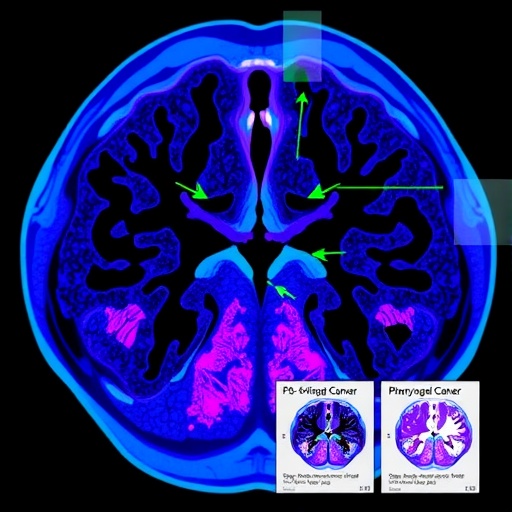In the ever-evolving battle against cancer, nasopharyngeal carcinoma (NPC) stands out due to its unique challenges in treatment and management. Locally advanced nasopharyngeal carcinoma (LA-NPC) is a particularly formidable adversary, often plagued by recurrence and distant metastasis despite current standard therapeutic regimens. Concurrent chemoradiotherapy (CRT) has long been the cornerstone of LA-NPC treatment; however, its limitations have spurred the oncology community to explore novel strategies. Among the most promising advancements in recent years are immune checkpoint inhibitors, specifically PD-1/PD-L1 inhibitors, which harness the body’s immune system to target and eradicate cancer cells.
A systematic review and meta-analysis spearheaded by Liu, Shang, Gao, and colleagues rigorously examined the therapeutic potential of PD-1/PD-L1 inhibitors in conjunction with CRT for patients with LA-NPC. The research team synthesized data from randomized controlled trials (RCTs) up to March 2025, scrutinizing both efficacy and safety outcomes to draw a comprehensive picture of this evolving treatment landscape.
The meta-analysis incorporated two high-quality RCTs encompassing a total of 575 patients. This relatively modest dataset nonetheless provided critical insights into how PD-1 inhibitor monotherapy, when paired with CRT, influenced disease progression metrics. Encouragingly, the addition of PD-1 inhibitors markedly improved progression-free survival (PFS) with a hazard ratio (HR) of 0.40, indicating a 60% reduction in the risk of disease progression or death compared with CRT alone.
Event-free survival (EFS), another important endpoint reflecting the duration patients remained free from disease events such as progression, recurrence, or death, also demonstrated significant improvement. The HR of 0.59 conveyed a substantial benefit, highlighting the potential of immunotherapy to enhance the durability of cancer control in this patient cohort. These findings suggest that immune checkpoint blockade may effectively suppress tumor proliferation and impede the mechanisms leading to cancer recurrence.
Beyond survival metrics, the study evaluated the rates of distant metastasis and locoregional recurrence, two key determinants of clinical outcomes and quality of life. PD-1 inhibitor treatment halved the odds of both metastatic spread (OR: 0.50) and local recurrence (OR: 0.43), underscoring its role in stalling the dissemination and resurgence of tumorous lesions. This dual suppression is particularly pivotal for LA-NPC, where both systemic and localized disease control critically influence patient prognosis.
However, the analysis revealed no significant differences in overall survival (OS), with an HR of 0.83. This finding urges caution, suggesting that while PD-1 inhibitors may delay disease progression and reduce recurrence, whether these advantages translate into prolonged life remains an open question requiring longer follow-up and more extensive data.
Safety constitutes a fundamental determinant of treatment feasibility. Notably, the integration of PD-1 inhibitors correlated with a heightened incidence of immune-related adverse events (IRAEs), with a striking Peto odds ratio of 11.14, reflecting a significantly elevated risk of immune-mediated toxicities. These adverse events, ranging from dermatitis to more severe autoimmune phenomena, pose clinical management challenges and necessitate vigilant monitoring.
Additionally, patients receiving PD-1 blockade experienced a moderate increase in severe (grade ≥3) adverse events (OR: 1.50). The incidence of these high-grade toxicities, which may require treatment modifications or hospitalization, speaks to the delicate balance oncologists must strike between harnessing immune activation and preventing harmful overactivation.
This systematic review thus charts a compelling narrative of promise tempered by caution. PD-1/PD-L1 inhibitors represent a transformative approach, revitalizing the immunotherapeutic arsenal against LA-NPC and addressing critical gaps left by CRT alone. Improved PFS, EFS, and diminished metastasis and recurrence rates portend better disease control, yet the absence of clear OS benefit and surging immune toxicities underscore the complexity of clinical translation.
Given the limited number of trials and participants, the authors emphasize the necessity for further robust investigation. Larger, multicenter RCTs with extended follow-up will be essential to definitively delineate the survival impact and long-term safety profile of PD-1/PD-L1 inhibitors in this nuanced clinical context. Moreover, mechanistic studies unpacking the interplay between immune checkpoint modulation and NPC tumor biology could refine patient selection and optimize therapeutic protocols.
From a broader perspective, these findings invigorate the discourse around integrating immunotherapy into multimodal cancer care. They illustrate the potential of personalized medicine approaches that go beyond the cytotoxic paradigm and leverage the immune system’s inherent power to fight cancer. For LA-NPC patients facing historically poor outcomes due to relapse and metastasis, such innovative modalities offer a glimpse of renewed hope.
Clinicians, researchers, and patients alike are watching closely as the field races to confirm and expand on these early signals. The evolution of PD-1/PD-L1 inhibitors in LA-NPC could herald a paradigm shift, making durable disease remission and improved life expectancy more attainable realities. Until then, the evidence compiled by Liu and colleagues lays the groundwork for this exciting journey — one filled with scientific rigor, clinical promise, and the ever-present undertaking of balancing efficacy with safety.
With the oncology community poised at this critical juncture, collaborative efforts and continued clinical vigilance will be paramount to unlocking the full potential of immunotherapy in nasopharyngeal carcinoma. As new data emerge, they will undoubtedly shape guidelines and therapeutic standards, ultimately striving to transform the lived experiences of patients battling this challenging disease.
In sum, the integration of PD-1/PD-L1 inhibitors with CRT in LA-NPC emerges as a beacon of hope, illuminating a path toward enhanced disease control and altered cancer trajectories. This systematic review and meta-analysis exemplify the rigorous scientific appraisal necessary to propel innovative therapies forward, offering a roadmap for future research and clinical application in the dynamic realm of cancer treatment.
Subject of Research: Evaluation of PD-1/PD-L1 inhibitors combined with concurrent chemoradiotherapy for treatment of locally advanced nasopharyngeal carcinoma through systematic review and meta-analysis of randomized controlled trials.
Article Title: PD-1/PD-L1 inhibitors for locally advanced nasopharyngeal carcinoma: a systematic review and meta-analysis based on randomized controlled trials
Article References:
Liu, X., Shang, Z., Gao, J. et al. PD-1/PD-L1 inhibitors for locally advanced nasopharyngeal carcinoma: a systematic review and meta-analysis based on randomized controlled trials. BMC Cancer (2025). https://doi.org/10.1186/s12885-025-15229-y
Image Credits: Scienmag.com




